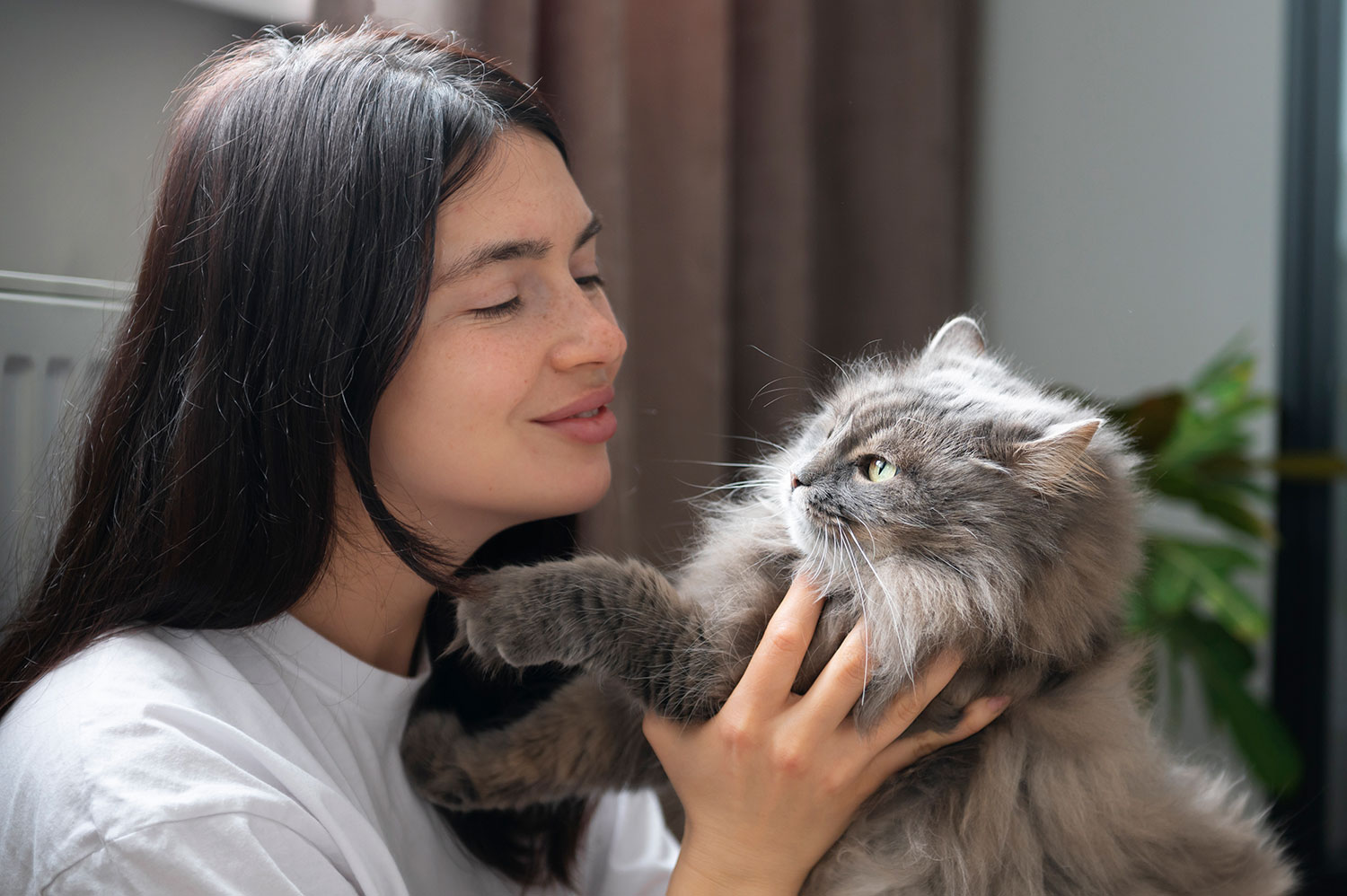Cat Treatment and Prevention

Feline Distemper, also called feline panleukopenia, is a highly contagious disease that is possibly fatal if not treated as soon as possible. Most cats have a strong immune system, which makes them resistant to several viruses and disease-causing bacteria. However, this doesn’t mean that they cannot acquire a severe illness.
Feline Distemper mainly affects the bone marrow and decreases the count of white blood cells in the body. Unvaccinated cats are seriously susceptible to this disease, especially kittens that came from the shelter.
There are early cat distemper symptoms you can watch out for, like loss of appetite, lethargy, vomiting, and bloody diarrhea. It has similar signs with other diseases, so it would be best to get them checked immediately for early intervention if you spot one.
Treatment
As of today, there is no known medication to kill the virus. Sadly, the odds of survival are low for every infected feline, but certain ways can still help with the recovery process. You can also try to help your cat at home if they are suffering from this infection.
Shedding
Shedding is the loss of hair, which usually happens in most animals, especially cats. It is their body’s way of releasing toxins and chemicals from their system. All of the infected cats in the house and the shelter should be put into quarantine while showing symptoms to protect other felines.
The virus thrives in their vomit, feces, and blood, which could then be transferred to other animals. The cat could also shed the distemper virus before showing clinical signs, so there is enough time to transmit the infection before the diagnosis.
Treatment at Home
Available home treatments include medication, a change in diet, and fluid therapy. Keep in mind that this infection is fatal, so it is essential to get a proper diagnosis and treatment from a reliable veterinary clinic.
However, you should consult first before starting at-home therapies to secure your cat’s safety and quick recovery.
Fluid Therapy
Cats experiencing diarrhea and vomiting are prone to dehydration, so it is essential to sustain them with lots of water. If they cannot drink independently, you can use a syringe to put water in their mouth.
You can also administer the fluids subcutaneously (in spaces under the skin). It can be given as often as needed, but be sure not to over-hydrate the cat.
Your trusted vet will give you instructions on what you can do, the amount you need, how frequently you have to do it, and the supplies necessary for the treatment.
Anti-Nausea Medications
Anti-nausea medications can help with the vomiting, and they will encourage the infected cat to eat normally. Although most medicines require a prescription, there are supplements and digestive enzymes you can purchase to help your feline’s stomach issues. Aspirin-related ingredients are toxic to cats, so refrain from using Pepto-Bismol and other related products.
Antibiotics
With feline Distemper, secondary infections and conditions may arise. These infections can be treated immediately with antibiotics, especially eyes or nasal discharge and pneumonia.
You can get one from your vet’s prescription and continue administering it to your cat at home. It comes with a specific dosage, and you must keep using it until all the pills are finished.
Diet
If the infected cat has a severe upset stomach, you can try to give them bland wet food to relieve the tension in their digestive system. Wet foods have higher water content, which can help with dehydration and easier processing.
Treatment at the Vet
If you choose to get your cat treated at a veterinary clinic for Distemper, they can use many available treatments to address the infection. This disease has several symptoms and secondary conditions, so it is essential to give each one attention.
Administer Fluids
Feline Distemper can cause dehydration, which is a severe case for most cats. It is essential to sustain their body with enough fluids, and IV is one way to administer the supply of water and electrolytes in their system.
Usually, the cat will receive a mild sedative and the vet will shave a specific area to inject the IV. A catheter will then be inserted using a needle, which will be attached to a drip and a bed of fluid to keep them stable.
B Vitamin Injections
Vitamin B12 has many benefits to a cat’s immune, digestive, and nervous systems. A healthy feline usually gets this vitamin from the food they eat, but its supply might not be enough for those suffering from Distemper due to loss of appetite. Vets use B-vitamin injections to stimulate a cat’s appetite and help them eat again.
Cobalamin, the vitamin B12 shot, can sustain the nutrient deficiency and is injected into the pocket between the skin and muscle.
Medications
Maropitant and metoclopramide are some of the anti-nausea medications that can ease vomiting symptoms. It can also fight other infections from damaging the body.
Prevention
People often say that prevention is always better than cure, and it applies accurately with Feline Distemper. There is no possible way yet to kill the virus, so vaccination is the best action to create a stronger immunity against this infection.
If you are only planning to adopt, check your prospective shelter and ensure that the environment is safe, clean, and well-maintained. You can also get your cat vaccinated at the nearest veterinary clinic.
What is the Feline Distemper Vaccine?
The cat Distemper vaccine is a safe and effective tool when it comes to the prevention of infection and spreading of the said disease. It is done by introducing small amounts of the virus into the cat’s body. The antibodies will then identify the infection and react quickly if the cat somehow contracts the virus again in the future.
Vaccination Schedule
In most cases, the Feline Distemper vaccine is administered to 6-month old kittens, and the boosters are given every 2 to 3 weeks until they reach 16 weeks old. The vaccine will then again be given at regular intervals throughout their adult life.
Pregnant cats should also get the vaccine because it will give stronger protection to the kittens through maternal antibodies. The benefits of vaccination are more significant than the risks, but you should consult a vet first to ensure that your cat can receive it without complications.
Common Reactions to the Vaccine
Although the vaccine is primarily safe, there are still some reactions your cat might get from it.
Each case is different, but mild reactions include:
- Lethargy
- Decreased appetite
- Swelling on the injection site
Some cats might get an allergic reaction and develop fever, swelling, and hives. On the other hand, severe reactions include:
- Difficulty in breathing
- Weakness
- Sudden collapsing
If the side effects last for more than two days, it would be best to contact your trusted veterinarian immediately and address the situation.
Disinfect
Aside from vaccines, you can also prevent your cat from getting this virus and other bacteria by disinfecting your home or the shelter. Always wash your hands and change your clothes before touching your pet when you go outside.
Indoors
To clean indoors, you should start by rinsing the surfaces and floors using water and a clean cloth or mop. This is important before some disinfectants get deactivated if they contact soap, detergents, and other organic matter.
Create a diluted bleach solution by mixing 1-part bleach with 32-parts water. It would help if you use this mixture to clean the items you plan on throwing out because it can still act as a carrier to spread the virus outside.
Let the bleach solution sit for at least 10 minutes before rinsing it with water and drying. Keep your cats away from the surface until it is completely dry since bleach is harmful to animals. Clean the litter pans, water and food bowls, scratchers, and toys regularly to keep them clean.
If you have a carpet, you should clean it with the mixture and a carpet steamer. Throw the remaining bleach solution down the toilet for proper disposal.
Outdoors
Panleukopenia can survive on surfaces without a host for more than a year, especially in moist and dark areas. If you always let your cat play outside, disinfection around your home will be a great idea.
Some disinfectants cannot kill the virus, but studies show that bleach can kill the pathogen of the virus. Spray the areas around your house with the bleach mixture.
Animal Shelters
There is a higher risk of virus transmission in shelters because the animals are closer to each other. Body fluids are a strong carrier of the infection, and they can be passed quickly from one cat to another through contact and ingestion.
It is necessary to clean animal shelters regularly with the use of a bleach mixture. You should wash beddings, blankets, and towels with hot water now and then. If an object is believed to be contaminated, it would be best to throw that away due to the virus’ resilience.
Wash Your Hands
Regular washing of hands is proven to prevent various diseases and the spread of many viruses. You should wear gloves when handling stool, vomit, or other animals that may have the infection.
Fabrics
Fabrics can also carry the virus and transfer it to other surfaces and animals. If you come in contact with an infected cat, change your clothes before touching other animals or place them in the washer right away.
Separate it from other laundries while washing to avoid contamination. You can also wash them with hot water and a good detergent with bleach.
In the worst cases, you should throw away the soiled clothes immediately.
Determining Your Cat's Risk of Infection
Shelters are often overcrowded with animals, and some even have several cats in one kennel. Close proximity with one another increases the risk of harboring the disease. These places need to get cleaned and disinfected often.
You should get your cat vaccinated against Feline Distemper, especially if they are always in contact with other animals.
Top 5 Frequently Asked Questions
Unfortunately, there is no cure for Feline Distemper yet. If your pets are showing early signs of the infection, you should bring them to the nearest clinic as soon as possible and get them checked. The vet will give you antibiotics, vitamins, and other essential medications to help with the recovery.
They might require blood or plasma transfusion and feeding tubes, and other advanced treatment for severe cases.
Based on recent studies, Feline Distemper is not contagious to humans, unlike other viruses such as rabies.
The most common side effects of the Feline Distemper vaccine are the following:
- Allergic reactions: swelling at the area of injection, pain
- Systematic reactions: decreased appetite, lethargy, fever
- Anaphylactic reactions: diarrhea, vomiting, difficulty in breathing, itchy face
Feline Distemper (panleukopenia) is one of the most contagious and fatal viruses in cats. Kittens have weaker immune systems, so they are more prone to get the infection. Affected cats need to get treated as soon as possible to prevent serious consequences.
Vets highly recommend getting every cat vaccinated by the Feline Distemper vaccine. This would help the antibodies fight the virus if your cat contracted them from the environment and other cats.
Adult cats must get the vaccine shot every three years.
Other Frequently Asked Questions
To prevent Feline Distemper, the vaccine is the best way to go with it. Make sure to maintain cleanliness in your home and wash your cat’s toys, beddings, and other items regularly. You can also ask your vet for the other things you can do.




